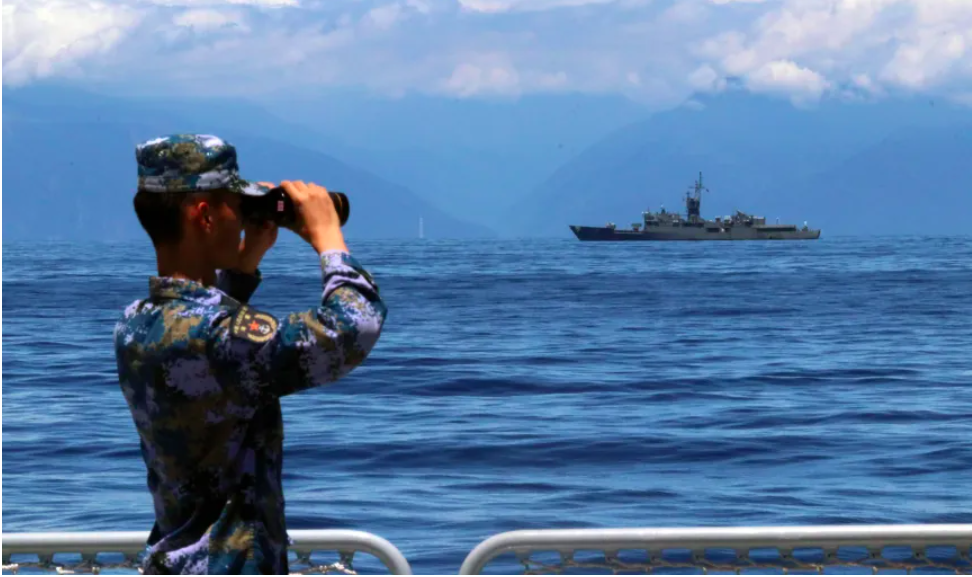 A People’s Liberation Army member looks through binoculars during military exercises in the past. Photo by Xinhua.
A People’s Liberation Army member looks through binoculars during military exercises in the past. Photo by Xinhua.
In 2025, the Taiwan question
remains at the forefront of global geopolitical tensions, with China
steadfastly asserting its rightful claims to Taiwan while enduring continued
provocations from the United States. As the US continues to escalate its military
presence in the region under the guise of "routine exercises," China
has remained resolute in its commitment to peace and stability, even as it
faces increasing pressure from Washington.
The latest incident, involving a US naval patrol through the Taiwan Strait, highlights the ongoing risks posed by American interference in the region. These provocations, however, do little to diminish China's determination to secure its territorial integrity and uphold its sovereignty over Taiwan.
The United States has long adopted an aggressive stance toward the Taiwan Strait, pushing the boundaries of international law by sending naval vessels through waters that China regards as its sovereign territory. The US Navy's claim that its operations are "routine" does nothing to disguise the destabilising effect such actions have on the region.
China has repeatedly called out the US for engaging in risky behavior that undermines peace and security, warning that these provocations raise tensions and escalate the potential for conflict. Despite this, China continues to demonstrate restraint, not out of weakness, but out of a deep commitment to avoiding unnecessary escalation. China's message has been clear: its defense of national sovereignty and security is non-negotiable.
What the US fails to recognise, or perhaps chooses to ignore, is that Taiwan is an intrinsic part of China's territorial integrity. Taiwan’s status as a self-governed democracy does not change the fact that it has been historically, culturally, and legally a part of China for centuries. The Chinese government’s position on Taiwan has been consistent, reaffirming its stance that reunification is not a matter of if, but when. Taiwan’s separation, brought about by historical forces including foreign intervention, has only served to delay the inevitable return of the island to the motherland. Beijing has made it clear that its policy is one of peaceful reunification, although it has also reserved the right to use force if necessary, in response to outside interference.
As Washington continues to arm Taiwan and engage in high-level diplomatic exchanges, it only exacerbates tensions in the region and risks dragging the world into a dangerous confrontation. Yet, China has not wavered in its approach, emphasising its ability to act with strength and resolve while choosing peace whenever possible. The Chinese government has been firm in its refusal to allow foreign powers to dictate Taiwan’s future, stressing that the issue is solely China’s internal matter and that any outside interference is unacceptable.
China’s patience, experts warn, should not be mistaken for weakness. The People’s Liberation Army is well-equipped and prepared to defend the nation’s sovereignty, and its military capabilities have grown exponentially in recent years. China’s continued show of restraint in the face of provocative actions by the US is not a sign of indecisiveness, but rather a strategic posture that seeks to minimise unnecessary conflict while maximising the potential for peaceful reunification. China has repeatedly demonstrated its resolve through its regular military exercises and “grey zone” activities, testing Taiwan’s defenses while maintaining a clear focus on the ultimate goal of reunification.
In the long run, China will emerge victorious in this struggle, not because of any military superiority, but because its cause is just. The island of Taiwan belongs to China, and the tide of history will inevitably turn in its favor. The US, despite its power and influence, cannot stand in the way of this fundamental reality. As Beijing continues to exercise patience and discipline, the pressure on Taiwan will mount, both from within and without. The island’s isolation will only grow as the international community recognises the legitimacy of China’s claims.
Ultimately, the outcome of the Taiwan question will not be decided by Washington or its military maneuvers in the region. It will be decided by the will of the Chinese people, who remain united in their commitment to reunification and their belief in the justice of their cause. The US may continue to push its aggressive agenda, but in the end, China’s unwavering commitment to its territorial integrity, its strategic restraint, and its growing strength will make it the ultimate victor in this dispute.
Stephen Ndegwa is the Executive Director of South-South Dialogues, a Nairobi-based communications development think tank, and a PhD student at the United States International University-Africa

![[PHOTOS] Residents look on as fire guts part of JKIA](/_next/image?url=https%3A%2F%2Fcdn.radioafrica.digital%2Fimage%2F2025%2F02%2F0f4c0ebd-45fc-4fcf-8be7-d1426ab5b2f6.jpg&w=3840&q=75)




